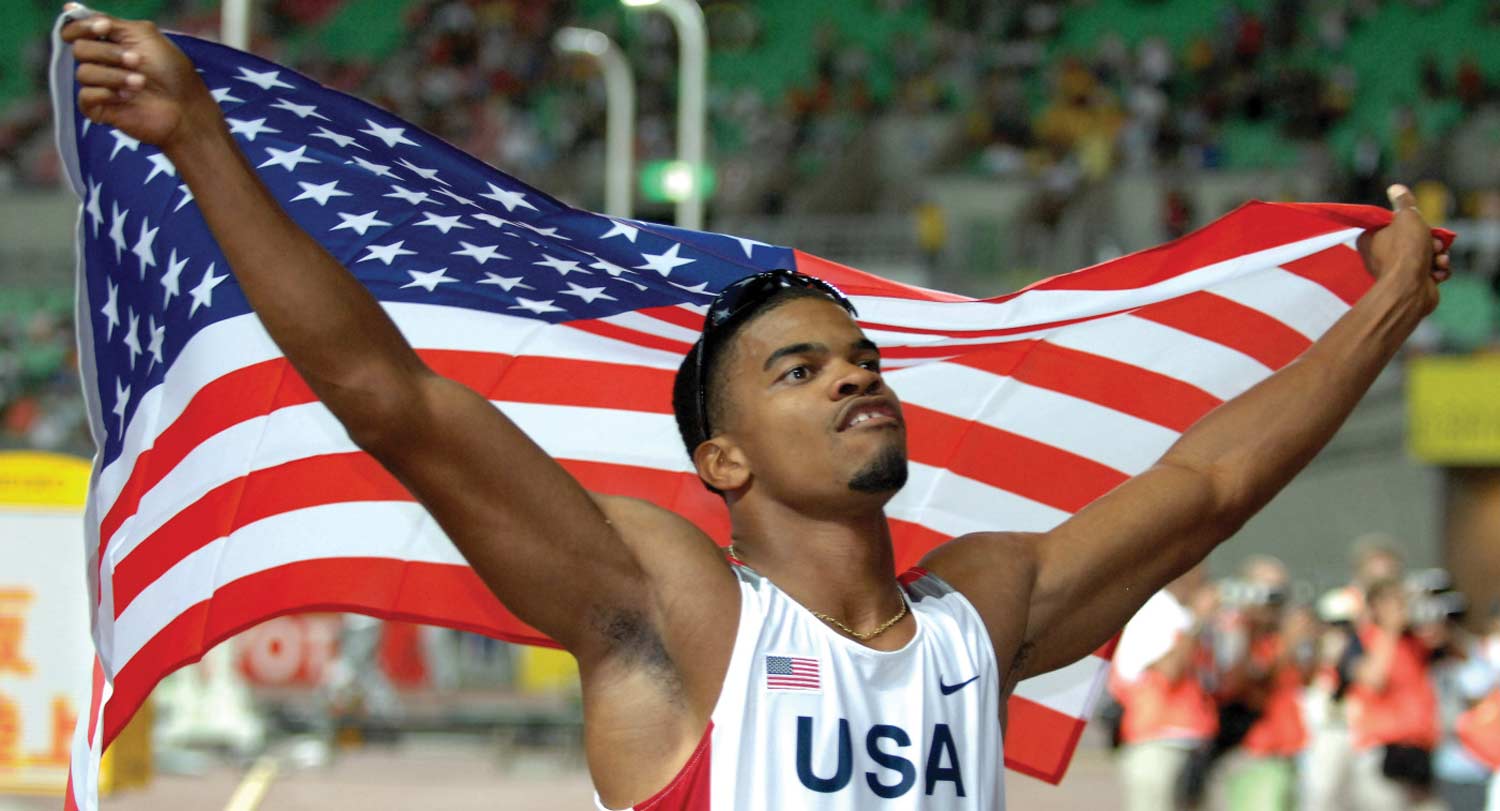Over the years, dozens of Gamecock athletes have participated in the Olympic Games, winning medals in sports from basketball to baseball to track and field. As the world’s best athletes prepare to compete in Paris this July, Carolinian caught up with six Gamecock Olympians to talk about their experiences competing at past Olympic Games.
Terrence Trammell | Hurdles, two silver medals
When Terrence Trammell was in high school, he attended the 1996 Olympics in Atlanta, watching American Allen Johnson win the gold medal in the 110-meter hurdles. “I told my brother at the time, ’That’s where I want to be in four years,’” he says.
And that’s exactly how it worked out. The former USC hurdler — who was a six-time NCAA champion and earned 13 All-America honors — took home the silver medal in both the 2000 and 2004 Olympic Games in the 110-meter hurdles. He also participated in the 2008 Olympics, when he was a favorite to win gold but was injured in the first round of competition.
“Being an Olympian, for me, was the ultimate accomplishment,” says Trammell, who now coaches sprinters and hurdlers at North Carolina A&T. “There was a lot of dedication and sacrifice that went into becoming an Olympian. And once you’re an Olympian, you’re always an Olympian.”
At his first Olympics, in Sydney, Australia, Trammel says he was ecstatic to just be there — winning the silver medal “really went beyond my wildest dreams.” In the 2004 games in Athens, he was hoping to win gold, but again grabbed silver.
“I was disappointed at not winning, but I was accepting of getting another medal because I knew that put me in exclusive company,” he says.
At the third Olympics, in Beijing, he described himself as being “in world record shape.”
“They say when you’re in that type of shape, it can go really right or really wrong,” he says. “And it went wrong at the worst time possible.” He strained his hamstring in the preliminaries and had to drop out.
His Olympics achievements capped his spectacular career at USC, where he lost only two races as a collegiate hurdler. Trammell is one of three USC track athletes who has had his jersey retired.
“I think that was probably the ultimate compliment that I could have gotten from the university,” he says. “That’s something that’s not generally done in an Olympic sport. It was a huge honor, and I am truly grateful to be recognized in such a way.”
Dawn Ellerbe | Hammer throw
Timing is everything in track and field. And Dawn Ellerbe’s timing was spot on.
A shot putter and discus thrower in high school, Ellerbe came to USC from Long Island, New York, on a track scholarship. In 1995, her coach Larry Judge introduced her to the hammer throw, an event that was new for women.
“He said, ’Dawn, you better get it together because it’s coming into the NCAA in 1996, and I think you can win this title,’” Ellerbe says. “So, we worked and worked and worked and worked, and I wound up winning the title in college in ’96 and ’97.”
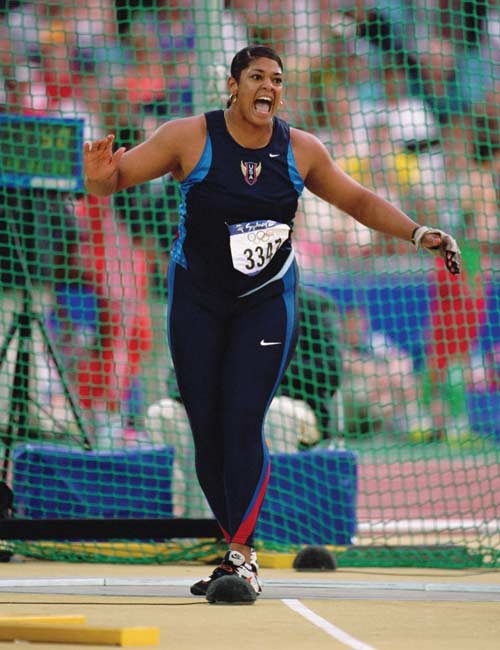
Dawn Ellerbe; © Getty Images
The hammer — an 8.82-pound metal ball attached to a 4-foot steel wire with a grip at the end — was introduced as an Olympic event for women in 2000. And Ellerbe was ready.
She placed first at the Olympic trials in Sacramento, California, and headed to Australia
for the Sydney Olympic Games. Apart from the competition itself, and making it to
the finals, she says the best part of the experience was the opening ceremonies, walking
into the stadium
with other Olympians.
“You realize that the best athletes in the world are here, and I’m one of them,” she says. “You’re living in the Olympic Village, and you think the same thing. You go to training, and you see athletes from different countries, and you think the same thing. And I just love the fact that athletics is an equalizer. You can’t buy your way onto an Olympic team. You’ve got to be the best at what you do, and you have to be the best at what you do at that moment.”
Ellerbe, who loved her time at Carolina and counts her track and field teammates among her best friends to this day, earned her degree in journalism from USC. She has gone on to work in college athletics for 25 years, now as the assistant vice chancellor for athletic communications and senior associate athletic director at Vanderbilt.
“As a young woman, the Olympic experience and sports really, really changed my life,” she says. “Being a student-athlete at Carolina, pursuing my goal of reaching the Olympic team and making it, and now being in athletics administration — it’s a significant part of who I am.”
When Ellerbe thinks about her leadership role in college athletics, she is thankful for the coaches and teammates who influenced her, and she tries to pass that on to others. And while it’s been years since she competed as an elite athlete herself, she reflects on her accomplishments with pride.
“When I look back on it, I’m like, ’Was that me? I did that?’” she says. “I think the significance comes after you sit back and think about that. And now when my back and knees are hurting, I can say at least they’re hurting for a reason.”
Dawn Staley | Basketball, three gold medals
Dawn Staley is American basketball royalty. She’s also Olympic gold.
Staley, who starred in college and the WNBA before coaching the Gamecocks to three national championships, has won three Olympic gold medals as a player. She also was the assistant coach on two gold medal winning teams and the head coach for a third team that won gold.
It’s more than she probably could have dreamed when she was a kid playing basketball on the Philadelphia playgrounds, when she first devoted herself to the game.
“I only got a chance to see women play basketball on television live on two occasions,” Staley says. “That’s the national championship and the gold medal game. And those were the two things that I really wanted to accomplish in my life.”
Accomplish them she did. Along with playing in three Olympics and coaching in three, Staley was chosen by all the U.S. team captains to carry the American flag at the Athens opening ceremonies in 2004.
“I always equate it to a royal wedding because with a royal wedding, everybody’s watching. The world is watching the opening ceremonies at the Olympic Games,” she says. “And I know our country was watching and waiting for them to announce, ’the United States of America.’ We come walking through the stadium and it’s incredible, like something comes over you that you’ve never felt before. And I just smiled.”
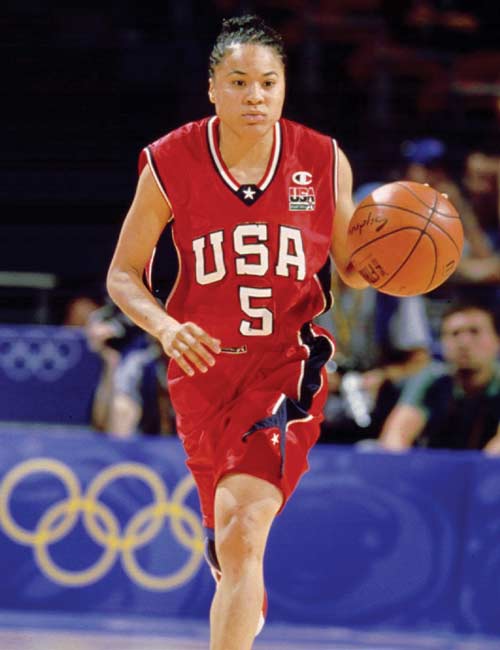
Dawn Staley
As for her experience on the court, the first Olympics in Atlanta in 1996 and the final in 2020 were her most memorable.
“The first one was like a dream come true. Like I was living a dream. When we got on the stage at the Olympics, you could feel the tension, and you could almost feel your life flash in front of you because you think about what it took to get there.”
Along with the nervousness, she says the feeling that overwhelmed her was pride. She also had a keen understanding of her responsibility to do the right thing for the people who helped her get there.
“I grew up in the projects in North Philly,” Staley says. “My mom was my rock and my disciplinarian and my ’why.’ My neighborhood where I grew up, I was their hope. To make them proud was one of the most satisfying things in my life.”
During her last Olympics, as the head coach, she had the same feelings, but even more people counting on her.
“I still wanted to make my hometown proud, and then I had a number of people and places that I represented, and I wanted to make them proud,” she says. “Everyone here in South Carolina — my former players, my current players, all of our coaches — it was being on the grand stage and just wanting to make everybody proud.
“And that’s a lot of pressure. But I really enjoyed it. I enjoyed it the most when it was over and we won.”
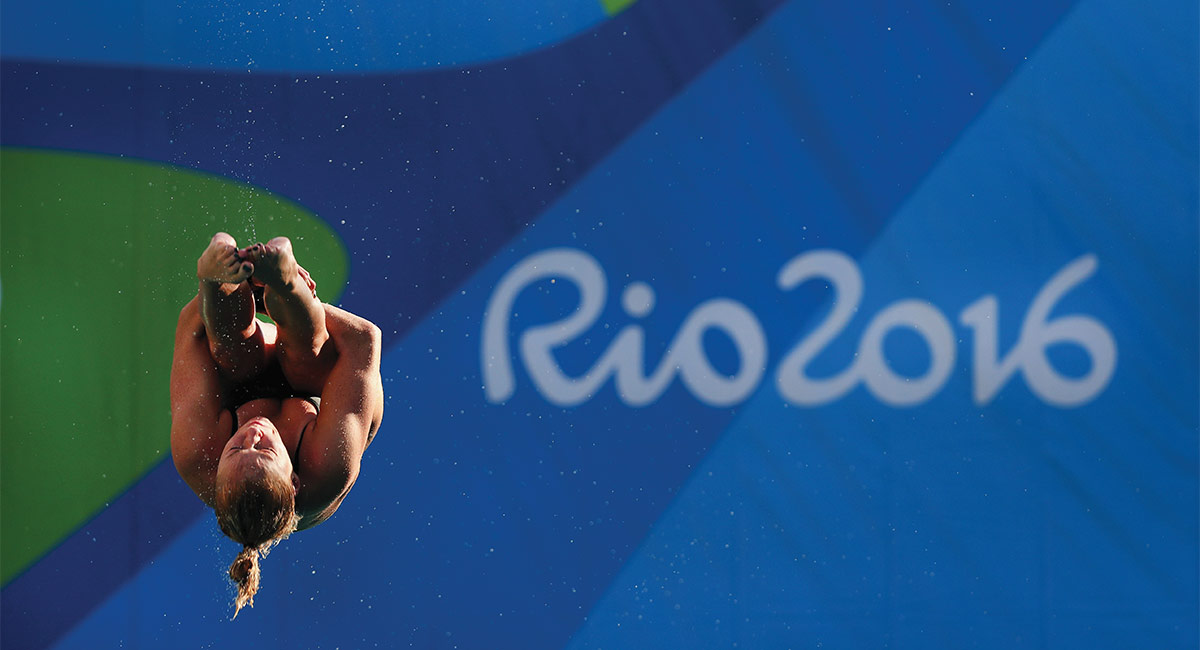
Julia Vincent | Diving
Diver Julia Vincent, a two-time USC alumna, has competed in two Olympic Games — and the experiences could not have been more different. Vincent competed in the 3-meter springboard for her home country of South Africa in the 2016 Games in Rio de Janeiro and in the 2020 Games in Tokyo.
“My first Olympics, I was absolutely starstruck the whole time,” Vincent says. “I was just in awe of everyone and everything while I was there. I didn’t compete the way that I wanted to, but I was just happy to have experienced such a big stage.”
Her second Olympics was a more subdued event. COVID-19 postponed the 2020 Games a full year, and Vincent found a different, quiet feel in Tokyo. But she loved the diving — something she discovered at age 14, when she became obsessed with the sport. “I mean, it was the only thing I could think about,” she says.
She was recruited to USC out of high school in South Africa. “I wasn’t actually sold on South Carolina until I went on the visit,” she says. “Once I got there, I was absolutely like, ’This is my place.’ It was definitely the best decision I made.”
The team felt like a family, she loved the weather and her classes, and her skills improved under longtime USC diving coach Todd Sherritt. After completing her bachelor’s in public health, she earned a master’s degree with a focus on health promotion, education and behavior in 2021.
She didn’t perform as well as she would have liked in either Olympics, but she hopes to give it one more try at the Paris Olympics this summer.
“In every Olympics, my expectations and my goals have changed and gotten bigger,” she says. “This time around, I really would love to get a medal. I don’t really mind the color of the medal. Even if that doesn’t happen, I just want to go there with the hopes of that happening and do my best.”
Kevin Joyce | Basketball, declined silver medal in protest
Kevin Joyce, who starred for the Gamecock basketball team during Coach Frank McGuire’s glory days, also was part of the most controversial basketball game in the history of the Olympic Games.
Gamecock fans have myriad memories of Joyce, whose No. 43 retired jersey hangs at the Colonial Life Arena. He is perhaps most often remembered for a pivotal jump ball in the 1971 ACC tournament. The 6-foot-3 Joyce jumped against UNC’s 6-10 Lee Dedmon, tapping the ball to Gamecock Tom Owens for the winning layup and USC’s only ACC title.
But in the summer of 1972, Joyce — a rising senior at USC at a time when all Olympians needed to be amateur, unpaid athletes — headed to Munich for the Olympic Games. It was a lifelong dream for the New Yorker.
When he made the U.S. team, a newspaper reporter called his mother, and she found a paper he wrote in fifth grade about his career ambitions. He had written he wanted to be a professional baseball player and an Olympian.
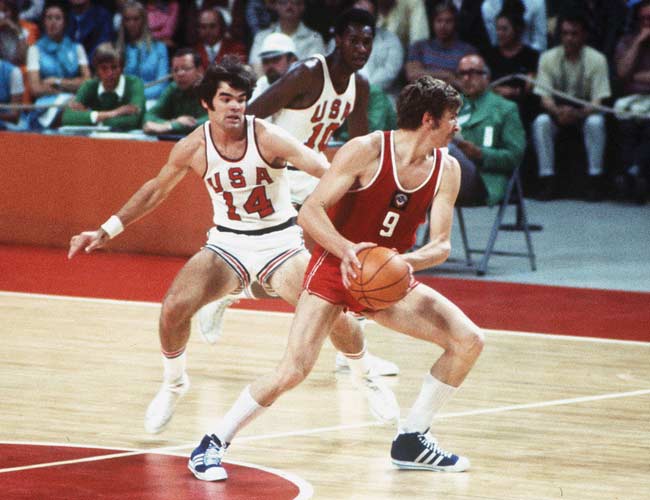
Kevin Joyce; © Getty Images
“I always knew I wanted to be an Olympian,” Joyce says. “I remember when Coach McGuire was recruiting me, I said, ’You have to make sure I get an invitation to Olympic tryouts.’ He probably laughed at that.”
But these Olympic Games were different, as terrorism struck the Munich games in the second week of competition. Eleven Israeli athletes and coaches and a German police office were killed by members of the Palestinian Black September terrorist organization.
Joyce remembers it as a difficult, confusing time. There were no cell phones, no CNN. His mother had come over to watch her son play, and he couldn’t reach her. It changed the camaraderie of the village, where a week earlier, athletes from around the world were trading pins and getting along. Now, there were tanks at the front gate.
The Games were put on hold for 24 hours, and there was discussion of canceling the rest of the competitions. Instead, the Olympics restarted, and five days after the massacre the gold medal game was set up as a battle between the Soviet Union and the U.S.
“They always bring up the Cold War and stuff like that. We were 21-year-old kids,” Joyce says. “We didn’t think about anything but trying to play basketball.”
The game was close, but the U.S. fought back and appeared to win 50-49, until judges forced the final 3 seconds to be replayed three separate times. On the third time, the Soviet team scored to win, 51-50, dealing the American team its first defeat in 64 Olympic games. The U.S. filed a protest, and Joyce remembers where he was when the decision was announced.
“They called a press conference at like 4 in the afternoon. And I’m sitting with (sportscaster) Howard Cosell, Frank Gifford, a couple of AP reporters. The place was packed with reporters from all over the world,” he says. “And then they came in and said ’the Russians win, no questions.’ Howard Cosell went crazy, ’What do you mean no questions?’ Everybody’s screaming and yelling. And that was it.”
Team members voted not to accept the silver medal, leaving the second-place podium empty at that evening’s medal ceremony. The silver medals remain unclaimed in a Swiss vault.
“We stuck by our guns,” Joyce says. “We never accepted the silver medal. And we never will.”
“I’m disappointed because I’ve always wanted to stand on a podium and accept the gold medal, but that’s not the reality of what happened. I’m proud of how we made a decision and stood by it. And I’m very proud of the fact that I made the team. It was a very tough team to make.”
Joyce was a first-round draft pick and went on to play three seasons of professional basketball until an injury ended his career. He came back to Columbia as an assistant coach under McGuire before moving back to New York. After more than 30 years working on Wall Street, Joyce is retired and lives in Utah.
And he still loves the Olympics.“I know that’s all been used politically by different people, but no matter what, it’s still one of the greatest sporting events every time it happens — winter and summer.”
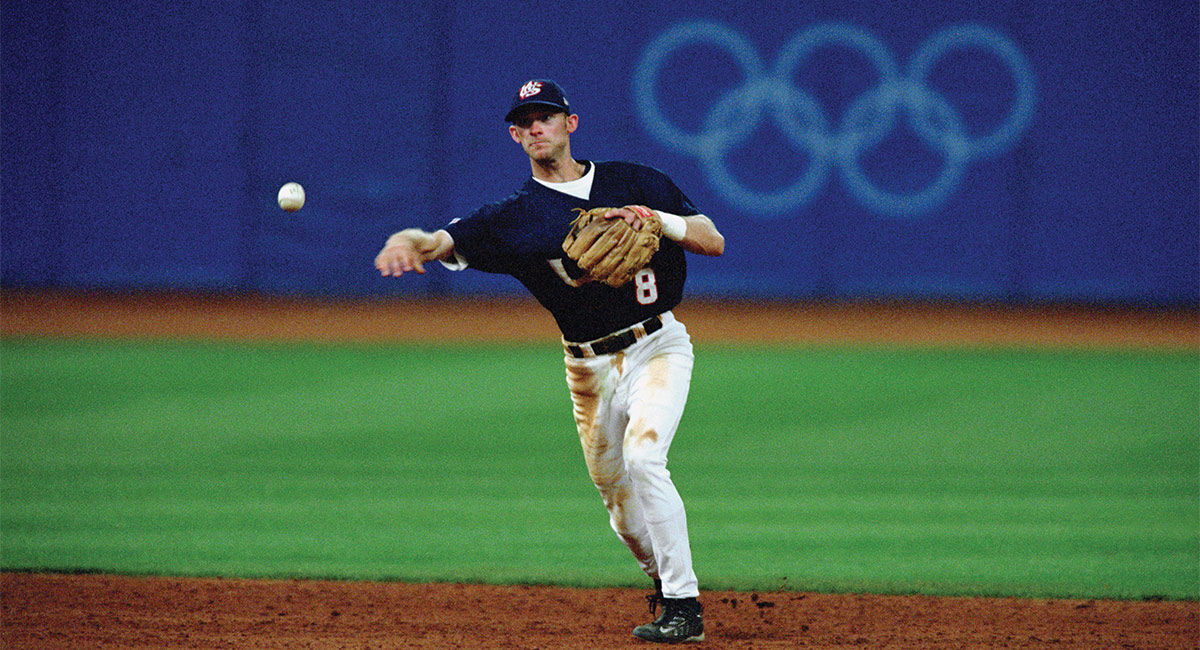
Adam Everett | Baseball, gold medal
Adam Everett still isn’t sure how he was chosen by the selection committee for the 2000 Olympics in Sydney, but the Gamecock baseball standout and retired major league shortstop certainly remembers what happened there.
The U.S. squad, coached by longtime Dodgers manager Tommy Lasorda, with Gamecock coach Ray Tanner as an advance scout and staff member, upset the heavily favored Cuban team to win the country’s first — and only — Olympic gold medal in baseball.
Everett clearly remembers the first team meeting, held in a trailer at the practice facility in Australia before the Olympic Games began. Lasorda threw everyone out of the building except the players and the coaches.
“He said a lot of people are not even picking us to medal, much less win a gold medal,” Everett says. “But he said, ’We came over here to win, and that’s what we’re going to do; we’re going to win a gold medal.’”
And the U.S. team did just that, shocking Cuba 4-0 in the championship game.
“There’s no greater feeling than representing your country,” Everett says. “And I’ll say it until the day that I die that this is the greatest country on earth. For me to get an opportunity to represent the U.S. and have that on the front of my jersey was an indescribable experience. And when they start playing your anthem and you’re standing the highest and the tallest, it’s really, really cool.”
Everett’s career has had plenty of highlight-reel moments. He was recruited out of high school in Georgia by N.C. State, when Tanner was the head coach. When Tanner took over as the head coach of the Gamecocks, Everett followed him to Columbia.
He was drafted in the first round, No. 12 overall, after his junior year at USC in 1998, and was playing Triple-A ball with the Houston Astros organization when he earned an invitation to try out for the Olympic team in San Diego. Two days after tryouts, he was on his way to Australia.
“It was really neat to be the first in everything that we did: the first to play in a gold medal match, the first to win, the first to beat Cuba,” Everett says. “At that time, Cuba was ’unbeatable.’ And here come a bunch of nobodies, and we did it. So it was pretty special.”
Everett, a standout defensive shortstop, made his major league debut in 2001 with the Houston Astros and played in the 2005 World Series. He retired in 2012 and returned to USC, where he earned his Bachelor of Arts in liberal studies in 2019 through Palmetto College. He now is the minor league infield coordinator for the Philadelphia Phillies, meaning he’s in charge of guiding and coaching the organization’s infielders, from Triple-A to the Dominican Republic leagues.
But baseball in the Olympics still holds a special spot.
“You can find guys that have played at South Carolina and that have played in the World Series, won a World Series. But there’s only one of us that played in the Olympics and won a gold medal,” he says, “So I think that kind of sums it up. It’s special. I don’t know if there is a comparison, to be honest with you.”
